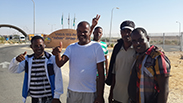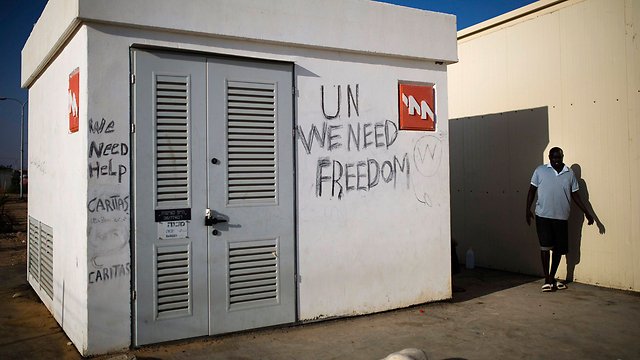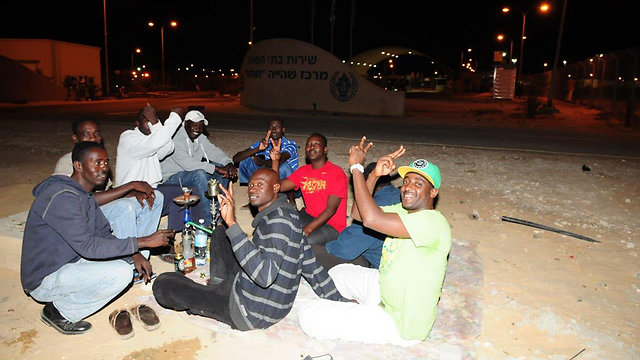
Israel has not granted refugee status to any Darfur genocide survivors, study finds
Report by Center for Refugees and Immigrants reveals Israel gives 0.19% of Eritreans and Sudanese nationals in Israel refugee status compared to other Western countries, where 70-80% are given refugee status.
Israel only accepts refugee requests from African asylum seekers in detention, and has not approved refugee status for any survivors of the genocide in Darfur, says a report by the Center for Refugees and Immigrants released Sunday.
The report was released a day before the Knesset was scheduled to vote on an amendment to the Prevention of Infiltration Law which would approve the continued operation of the Holot detention facility, but limit remand of asylum seekers to a year and 8 months. The law, passed by the Knesset in two different incarnations, has twice been overturned by the Supreme Court.

The report points to failures in Israel's policy on giving refugee status and its judicial interpretation of international law regarding refugees, which has led Israel to deny refugee status to asylum seekers from Eritrea and Sudan.
Compared with other Western countries, where 70-80 percent of Eritreans and Sudanese asylum seekers receive refugee status, Israel recognizes 0.19 percent of asylum seekers as refugees, and denied 5,901 refugee requests between 2011 and 2013. During those years, Israel recognized only two Eritreans as refugees and not one Sudanese.
The report disputes Israel's claim that it has never denied citizens of Eritrea or Sudan the option of applying for asylum, noting that before 2013, citizens from Eritrea and Sudan were excluded from the asylum system.
The manager of the Treatment of Asylum Seekers unit is quoted in the report as saying in 2009 that "at this point, the unit does not treat foreign nationals who are entitled to temporary protection."
According to the report, Eritrean and Sudanese nationals have only been able to submit requests for asylum since 2013, and only requests by detained asylum seekers were examined. The Center for Refugees and Immigrants has not heard of any cases in which an asylum seeker who was not in detention has received a decision on his asylum request.
Turning to the way requests are being examined, the report describes absolute patterns of rejection which indicate, according to the report's authors, faults in the interpretation of international law.
For Eritrean citizens, the Interior Ministry issues the same rejection message with uniform text to all applicants. Such a response states that army desertion or escaping forced recruitment are not sufficient grounds for asylum and therefore the application is rejected. At the same time, the notice states that the asylum seeker will not be expelled given the "temporary no-expulsion" policy.
Unlike the identical messages sent to Eritrean asylum seekers, the rejection of asylum notices sent to Sudanese nationals uses vague reasoning such as the asylum seeker's lack of credibility, which is based on imaginary contradictions, or difficulty remembering minute details, contradictions in minor details that have nothing to do with the very heart of the asylum request, insufficient research on the conditions in their countries of origin, translation issues, and so on.
The Holot detention facility currently holds 2,200 asylum seekers from Eritrea and Sudan, the majority of whom are from Darfur.
The report's authors say that the current state of affairs shows that the State of Israel recognizes the danger those expelled will face and the fact this is not a viable option, and is therefore not expelling them. At the same time, however, the state refuses to recognize the fact the reason for the danger is what leads these asylum seekers to ask for protection of the Convention Relating to the Status of Refugees.
The state won't expel them, the report's authors say, but at the same time refuses to give them any kind of status, holds them in detention facilities like Holot, and works to encourage them to go back to the very place it admits poses a danger to them.
The state also won't give them job permits - a situation that ensures they remained in the margins of the law, without security and basic rights, the report's authors say.
 |
The Administration of Border Crossings, Population and Immigration said in response, "The administration receives thousands of requests a year by infiltrators and other foreign populations. The requests are examined privately and individually, a test which usually takes some time. The claims raised in the report are repeated without any basis in fact, and even thought they were refuted in the past, they continue to be raised."











